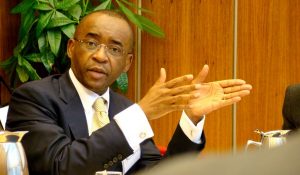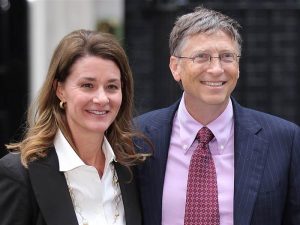

Bill Gates and Melinda French Gates are shaking up control of their $50 billion foundation, one of the world’s most powerful philanthropic organisations, fulfilling a promise made after they announced their split last year.
The Gates Foundation is adding four new members to its board of trustees: chief executive officer Mark Suzman; Zimbabwean billionaire Strive Masiyiwa; Thomas Tierney, the co-founder of Bridgespan Group, one of the nonprofit industry’s most powerful consultants; and Minouche Shafik, a former World Bank official who’s now director of the London School of Economics.

Strive Masiyiwa, Econet Group founder
“We are honoured that these deeply knowledgeable and respected individuals have agreed to join the foundation board,” Suzman, 53, said in a statement on Wednesday. “They bring an incredible track record of impact across global business, philanthropy and development.”
The Seattle-based foundation said there could be as many as nine members in the future. Talks are “ongoing about adding to the initial slate to enhance representation across gender, geography and expertise.”
The new members join Gates and French Gates on the board, adding a measure of diversity to a group previously comprised of a tiny circle of friends and family. This included Bill’s father, who died in 2020, and Warren Buffett, who has donated more than $30 billion to the charity.
Shortly after the announcement of the divorce, the Berkshire Hathaway Inc. chief announced he was stepping down from the foundation, emphasizing that it was because he had an “inactive role.”
The 91-year-old, however, has long sought to avoid conflict and at the time he left the divorce was becoming increasingly acrimonious. Unflattering reports emerged of Gates’s infidelity, ties to the dead sex offender Jeffrey Epstein, and assertions that his money manager Michael Larson operated a toxic work environment.

Melinda and Bill Gates (file pic)
The foundation put in place measures to ensure it would continue to function, announcing that the ex-couple would add $15 billion to the $50 billion endowment over the next few years and added a nuclear option: French Gates would step down after two years if the two couldn’t work together.
If she departs, French Gates, 57, will receive money from Gates, 66, for her philanthropic work that’s separate from the foundation’s endowment.
Gates has already transferred billions of dollars of stock in companies to French Gates, who’s building up her own philanthropic investment firm, Pivotal Ventures.
With billions of dollars per year in grants, the foundation operates across the globe with a focus on health, gender and education. The philanthropic world has been speculating whether a new board — the governing body of the organisation — would shift its approach to giving.
The initial announcement also raised expectations it would lead to increased diversity, an issue in the world of big money philanthropy.
Edgar Villanueva, founder of the Decolonising Wealth Project, said this is particularly important for the Gates Foundation because of its global influence.
“What they do in the world creates a major steer for the industry, so all eyes are on them,” he said this month.
Masiyiwa is founder and executive chairman of Econet Global, a telecommunications company that operates across Africa, Asia, Europe and Latin America. Econet offers phone, broadband and satellite service, and is also a major provider of mobile payments, a focus of the Gates Foundation’s work in Africa expanding financial services for the poor.
 Masiyiwa said in the statement that he’s worked with the foundation for 20 years, “beginning with efforts to improve agricultural production for more than 400 million smallholder farmers in Africa, to improving livelihoods for the poorest people across Africa and the world.”
Masiyiwa said in the statement that he’s worked with the foundation for 20 years, “beginning with efforts to improve agricultural production for more than 400 million smallholder farmers in Africa, to improving livelihoods for the poorest people across Africa and the world.”
Shafik, the only other woman on the board aside from French Gates, has worked for the World Bank, the UK’s Department for International Development and is a former deputy governor of the Bank of England. Shafik, who was born in Egypt, schooled in the US and was appointed a UK baroness in 2020, is currently director of the LSE.
Tierney founded Bridgespan in 2000 — around the time the Gates Foundation was formed — after running management consultancy Bain & Co.
The Gates Foundation has worked with Bridgespan, which has grown more prominent recently for its role in helping MacKenzie Scott dole out billions of dollars at a record pace.
Suzman, a former journalist and United Nations employee who grew up in apartheid South Africa, joined the organisation in 2007 and was promoted to the top job in February 2020. Suzman, who’s white, said in a letter on Wednesday that he’s made diversifying the foundation’s staff and giving a key goal.
Diversity is also a priority when adding new board members.
“We’re in active conversations about adding to our initial slate to enhance representation across gender, geography and expertise,” Suzman wrote in his first annual letter for the foundation, a job typically done by Gates and French Gates.
A “technocratic ethos” has dominated the Gates Foundation, and the expanding board could “become an opportunity to incorporate more community-centred perspectives into its leadership,” said Benjamin Soskis, senior research associate at the Center on Nonprofits and Philanthropy at the Urban Institute.
— Bloomberg